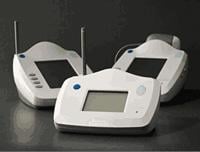
May 6, 2011 – Results from an analysis of the ALTITUDE Clinical Science program demonstrated that defibrillator therapy saves lives from lethal arrhythmias without an increase in mortality due to defibrillator shock. Instead, the authors found that increased mortality risk associated with these shocks is not attributed to the defibrillator shock itself, but rather to the underlying medical condition leading to atrial and ventricular arrhythmias.
ALTITUDE analyzes outcomes data from patients monitored by the Latitude Patient Management system. Brian Powell, M.D., assistant professor of medicine at the Mayo Clinic, presented results during a late-breaking trial session at the Heart Rhythm Society Scientific Sessions in San Francisco.
"The ALTITUDE Clinical Science program continues to provide groundbreaking data on survival after device implantation and has greatly advanced our understanding of the natural history of arrhythmias and how device programming influences patient outcomes," said Leslie Saxon, M.D., chief of cardiovascular medicine at University of Southern California and chairperson of the ALTITUDE physician panel. "What these data tell us is that patients who have atrial fibrillation or ventricular arrhythmias and receive shocks should be monitored and treated aggressively. While shocks should only be delivered when necessary, it is encouraging to know that shock therapy from these devices does not increase mortality."
The ALTITUDE program enhances physician understanding of device therapy, outcomes and disease progression in a real-world setting for device patients followed by the Latitude Patient Management system. The system lets physicians conduct remote follow-up of implantable cardiac device patients to monitor specific device information and heart health status. The system also detects clinical events between scheduled in-clinic visits and sends relevant data directly to physicians. Since its introduction in 2006, Boston Scientific has enrolled more than 190,000 patients.
Boston Scientific's latest implantable cardioverter defibrillators (ICDs) and cardiac resynchronization therapy defibrillators (CRT-Ds) feature AcuShock, an advanced technology that can distinguish between a potentially lethal heart arrhythmia and a non-lethal arrhythmia within seconds. This can help to minimize inappropriate and unnecessary shocks.
"Our devices deliver painless pacing therapy far more than shocks to treat potentially lethal arrhythmias, while demonstrating extremely low rates of inappropriate shocks," said Kenneth Stein, M.D., chief medical officer, cardiac rhythm management for Boston Scientific. "Recent data from a large number of patients from our ALTITUDE program show that nearly 98 percent were free of an inappropriate first shock within the first year of therapy when physicians chose to use AcuShock features in our Cognis and Teligen devices."
For more information: www.bostonscientific.com


 January 05, 2026
January 05, 2026 









